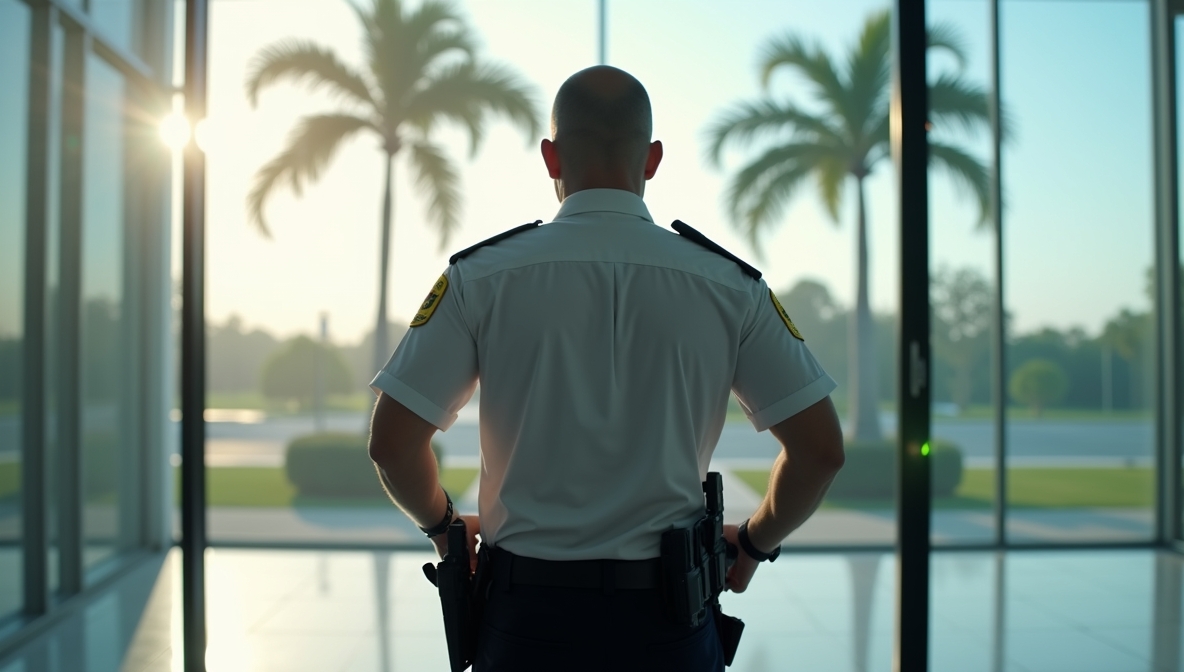Florida's armed security guard background check process requires comprehensive screening through both state and federal databases, with specific requirements varying between Class G (armed) and Class D (unarmed) licenses. The process typically takes 6-8 weeks and includes fingerprinting, criminal history verification, and mental health evaluations mandated by Florida Statutes Chapter 493.
Key Takeaways
- Class G armed security licenses require more extensive background checks than Class D unarmed positions, including psychological evaluations and firearms training verification.
- All Florida security officers must complete Level 2 background screening through the Florida Department of Law Enforcement (FDLE) and FBI databases.
- Disqualifying offenses include any felony conviction, domestic violence charges, and specific misdemeanors related to dishonesty or violence within the past 10 years.
- The background check process costs between $75-$150 and typically takes 6-8 weeks to complete from application submission.
- Employers must verify both the license status and background check completion before hiring armed security personnel.
- Background checks must be renewed every two years along with license renewal, with ongoing monitoring for new criminal activity.
Understanding Florida Security Guard License Classifications
Florida divides security officer positions into two main categories. Each classification requires different levels of background screening. The Florida Department of Agriculture and Consumer Services manages both license types under Chapter 493.
Class D licenses cover unarmed security positions. These require basic background checks and 40 hours of training. Meanwhile, Class G licenses apply to armed security guards. These positions demand enhanced screening and 68 hours of minimum training.
Armed security positions carry greater responsibility. Therefore, the state requires more thorough background investigations. This approach protects public safety while maintaining professional standards. Additionally, armed guards must pass psychological evaluations and firearms proficiency tests.
The distinction between these license types affects employment opportunities significantly. Many employers prefer hiring guards who hold both classifications. This flexibility allows workers to accept various assignments based on client needs.
Florida Armed Security Background Check Requirements
Level 2 Background Screening Components
Florida's Level 2 background screening represents the most comprehensive investigation available in the state. This process examines multiple databases to create a complete applicant profile. Both state and federal records are included in this thorough review.
The screening searches Florida Crime Information Center (FCIC) databases first. Next, investigators check National Crime Information Center (NCIC) records. Finally, local arrest records and court dispositions are reviewed for completeness.
Criminal History Database Searches
Background investigators examine criminal records from all available sources. They search for arrests, convictions, and pending cases nationwide. This comprehensive approach ensures no criminal activity goes undetected.
The process includes reviewing juvenile records where legally accessible. Additionally, investigators check for any outstanding warrants or court orders. Military records may also be examined for relevant criminal history.
Identity Verification and Documentation
Applicants must provide multiple forms of identification during the screening process. Birth certificates, Social Security cards, and driver's licenses are typically required. All documents must be current and unaltered for acceptance.
| Document Type | Acceptance Criteria | Processing Notes |
| Birth Certificate | Certified copy only | Must be government issued |
| Social Security Card | Original or certified copy | No laminated versions accepted |
Officials verify identity through cross-referencing submitted documents. This prevents fraud and ensures accurate background investigations.
Disqualifying Criminal History for Armed Security Guards
The state maintains strict criminal history standards for armed security licensing. Certain offenses result in permanent disqualification from licensing. Others create waiting periods before eligibility can be established.
Felony convictions permanently bar applicants from armed security positions. Domestic violence charges also create permanent disqualification. Additionally, sexual offenses and crimes against children prevent licensing eligibility.
Misdemeanor offenses may create temporary barriers to licensing. Theft-related crimes typically result in 10-year waiting periods. Similarly, fraud or dishonesty charges prevent licensing for a decade. Drug-related misdemeanors also fall into this category.
Violence-related misdemeanors receive careful scrutiny during the evaluation process. Battery charges, assault convictions, and weapons violations often result in denials. However, the circumstances surrounding each offense are considered individually. Furthermore, the age of the offense and evidence of rehabilitation may influence decisions.
The Application and Screening Process Timeline
Pre-Application Requirements
Applicants must complete several steps before submitting their licensing application. Training courses must be finished through state-approved schools. Additionally, psychological evaluations and medical examinations are required.
Firearms proficiency testing represents another crucial pre-application step. Applicants must demonstrate safe handling and accurate shooting abilities. These tests occur at certified ranges with qualified instructors.
Required documentation should be gathered during this phase. Birth certificates, identification cards, and proof of residency are essential. Moreover, training certificates and examination results must be properly prepared.
Application Submission Process
The Florida Department of Agriculture accepts applications through online and mail submission methods. Online applications process faster and provide immediate confirmation receipts. However, some documents may still require physical submission.
Application fees must be paid at the time of submission. Credit cards are accepted for online applications. Meanwhile, mail applications require certified checks or money orders for payment.
Quality control reviews occur before applications enter the investigation phase. Missing signatures, incomplete sections, or illegible documents cause immediate rejections. Therefore, applicants should review submissions carefully before finalizing them.
Background Investigation Phase
FDLE begins the background investigation immediately after receiving complete applications. Fingerprints are processed through both state and federal databases. This typically takes 3-4 weeks for initial results.
Additional verification may be required for complex cases. Out-of-state criminal history often requires extra processing time. Name changes or missing documentation can also extend investigation timelines.
Criminal history hits trigger detailed case reviews by licensing analysts. Court records are obtained to verify dispositions and sentencing information. Additionally, probation departments may be contacted for compliance status updates.
Fingerprinting and Biometric Requirements
All applicants must complete electronic fingerprinting at approved LiveScan locations. These facilities capture high-resolution digital prints for database submission. Quality fingerprints are essential for successful processing.
Poor fingerprint quality results in automatic rejection and resubmission requirements. This adds 2-3 weeks to the overall processing timeline. Therefore, applicants should ensure proper finger preparation before appointments.
LiveScan locations operate throughout Florida for applicant convenience. Most police departments offer these services during regular business hours. Additionally, private vendors provide extended hours and weekend appointments.
| Location Type | Average Cost | Typical Hours | Appointment Required |
| Police Departments | $25-$40 | Business hours only | Usually required |
| Private Vendors | $35-$55 | Extended hours | Recommended |
| Sheriff's Offices | $30-$45 | Limited hours | Always required |
Applicants should call ahead to confirm availability and scheduling requirements. Some locations offer walk-in services during specific hours.
Psychological Evaluation Requirements for Armed Guards
Florida law requires psychological evaluations for all armed security guard applicants. These assessments evaluate mental fitness for carrying firearms professionally. Licensed psychologists or psychiatrists must conduct these evaluations.
The evaluation process typically takes 1-2 hours to complete. Standard psychological tests are administered during the session. Additionally, clinical interviews assess judgment and decision-making abilities.
Evaluations must be completed within six months of application submission. Older evaluations are not accepted for licensing purposes. Furthermore, the evaluating professional must be licensed in Florida.
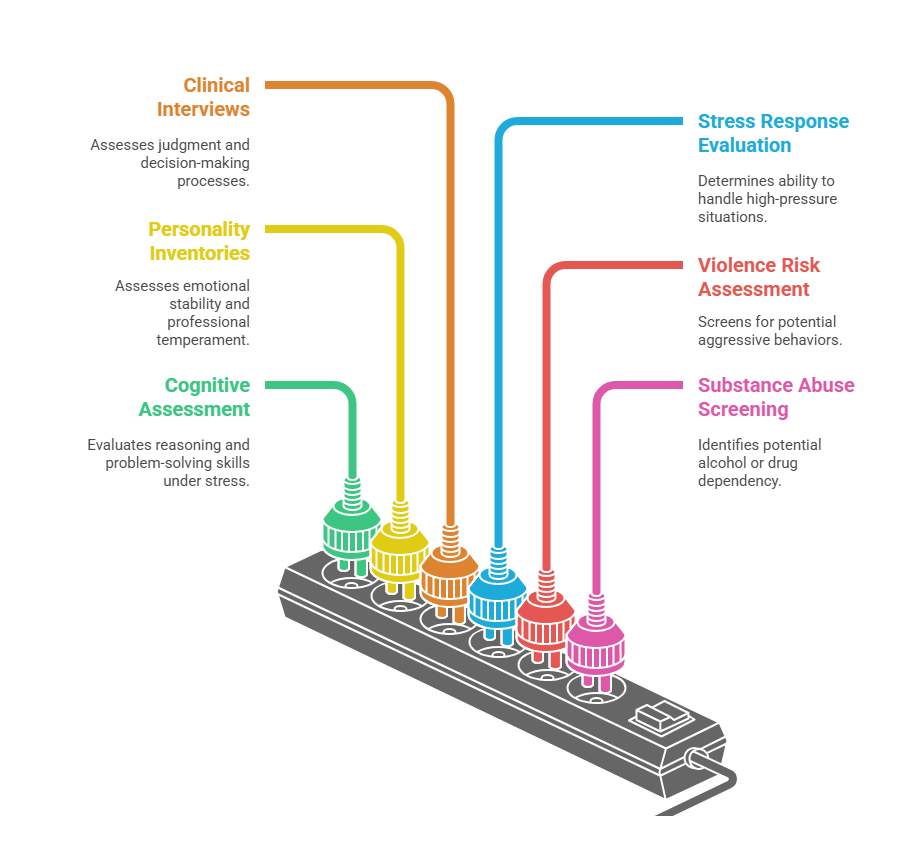
- Cognitive Assessment Tests: Measure reasoning and problem-solving abilities under stress
- Personality Inventories: Evaluate emotional stability and professional temperament
- Clinical Interviews: Assess judgment capabilities and decision-making processes
- Stress Response Evaluation: Determine ability to handle high-pressure security situations
- Violence Risk Assessment: Screen for potential aggressive behaviors or impulse control issues
- Substance Abuse Screening: Identify potential alcohol or drug dependency problems
Results are submitted directly to the licensing agency by the evaluating professional. Applicants cannot access or submit their own evaluation results. Additionally, failed evaluations cannot be appealed through the standard process.
Training and Education Prerequisites
Armed security guards must complete comprehensive training before licensure. State-approved schools offer the required 68-hour curriculum. This training covers legal responsibilities, firearms safety, and emergency procedures.
Classroom instruction typically requires 40 hours of attendance. Range training accounts for the remaining 28 hours. Students must demonstrate proficiency in both areas for course completion.
Training costs vary significantly between different approved schools. Urban areas typically offer more competitive pricing due to increased competition. Rural locations may have higher costs but shorter waiting lists.
The curriculum includes constitutional law, criminal procedures, and use of force guidelines. Students learn about citizen's arrest powers and liability limitations. Additionally, report writing and emergency response protocols are covered extensively.
Firearms Training Components
Firearms training includes both classroom and practical range instruction. Students learn weapon safety, maintenance, and legal use guidelines. Additionally, marksmanship skills are developed and tested.
Range qualification requires achieving minimum accuracy standards. Students must hit target zones consistently from various distances. Failure to meet standards requires additional training and retesting.
Advanced firearms techniques may be included in some programs. These cover low-light shooting, tactical reloading, and malfunction clearance procedures. However, basic safety and accuracy remain the primary focus areas.
Medical Examination and Physical Requirements
Armed security guards must pass medical examinations before licensing. These evaluations assess physical fitness for armed security duties. Licensed physicians must conduct these examinations within six months of application.
The medical evaluation covers vision, hearing, and cardiovascular health. Additionally, neurological function and motor skills are assessed. Any conditions that might impair judgment or physical performance are carefully evaluated.
Vision requirements include both distance and near vision testing. Color blindness may disqualify applicants depending on severity. Corrective lenses are acceptable if they provide adequate vision correction.
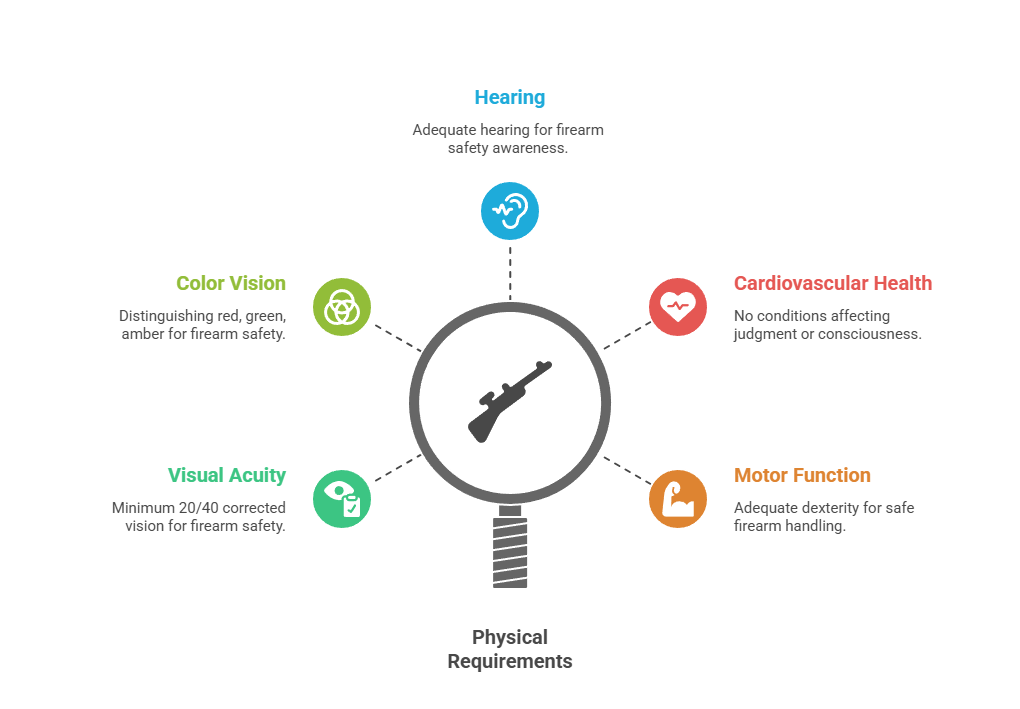
- Visual Acuity: 20/40 corrected vision minimum required
- Color Vision: Ability to distinguish red, green, and amber colors
- Hearing: Adequate hearing with or without aids
- Cardiovascular Health: No conditions affecting judgment or consciousness
- Motor Function: Adequate dexterity for safe firearm handling
Medical conditions requiring ongoing treatment receive individual evaluation. Diabetes, heart conditions, and seizure disorders may require additional documentation. The licensing agency reserves discretionary authority for medical fitness determinations.
Employer Verification and Compliance Responsibilities
Employers must verify license status before hiring any armed security personnel. The Florida Department of Agriculture provides online license verification systems. This database updates in real-time with current license status.
Additionally, employers should maintain copies of all licensing documentation. Background check certificates, training records, and psychological evaluations must be kept on file. These records demonstrate compliance with state regulations.
Regular monitoring of employee license status prevents compliance violations. Automated systems can track renewal dates and notify management. This proactive approach avoids potential legal and financial consequences.
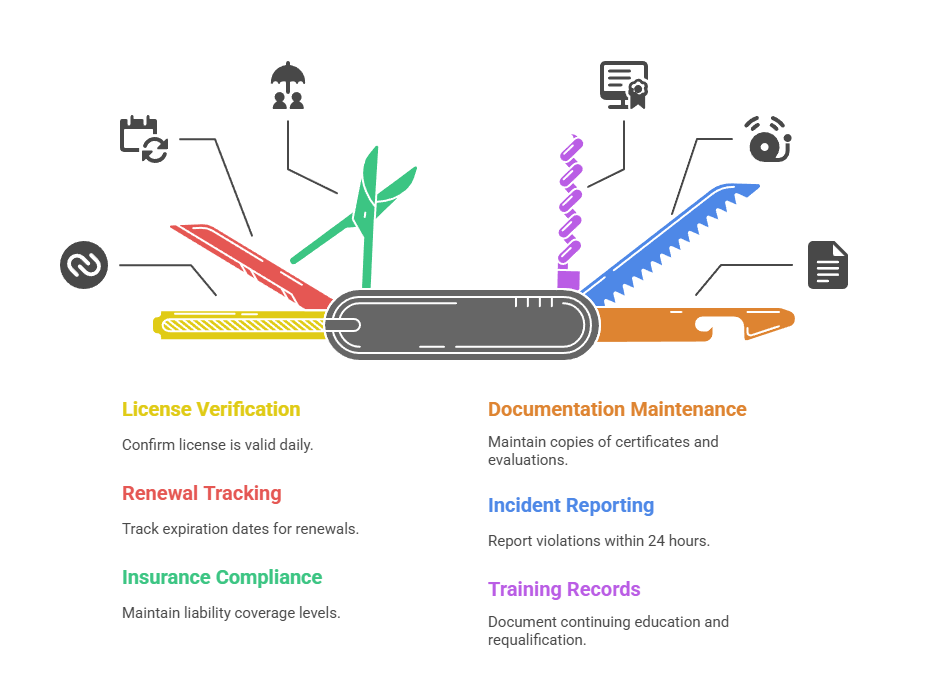
- License Status Verification: Check current validity through state database daily
- Documentation Maintenance: Keep copies of all required certificates and evaluations
- Renewal Tracking: Monitor expiration dates for timely renewals and training updates
- Incident Reporting: Report violations or criminal activity within 24 hours
- Insurance Compliance: Maintain required liability coverage levels at all times
- Training Records: Document all continuing education and firearms requalification
Non-compliance can result in significant penalties and license revocation. Therefore, employers should establish comprehensive tracking systems. Additionally, regular audits ensure ongoing compliance with all requirements.
Background Check Costs and Fee Structure
The total cost for Florida armed security guard background checks varies by individual circumstances. State application fees are set at $75 for Class G licenses. However, additional costs accumulate throughout the process.
Fingerprinting fees range from $25 to $55 depending on the service provider. Training costs typically fall between $200 and $400. Psychological evaluations add another $100 to $200 to the total expense.
Medical examinations represent another significant cost component. These evaluations typically range from $75 to $150. Additionally, some physicians charge extra for completing required forms.
Additional Cost Considerations
Transportation costs should be factored into the total budget. Multiple appointments at different locations are often necessary. Therefore, applicants should plan for travel expenses and time off work.
Retesting fees may apply if initial attempts are unsuccessful. Firearms qualification retesting typically costs $25 to $50. Similarly, failed psychological evaluations require new examinations at full cost.
Document preparation costs can add to the total expense. Certified copies of birth certificates cost $10 to $25. Additionally, notarization fees apply to various application documents.
Payment Methods and Processing Options
Most fees can be paid using credit cards or electronic transfers. However, some providers only accept cash or certified checks. Applicants should verify payment methods before scheduling appointments.
Online payment systems offer convenience and immediate processing. They also provide electronic receipts for record-keeping purposes. Traditional payment methods may require additional processing time and verification.
Some training schools offer payment plans for course fees. These arrangements help applicants manage the financial burden. However, licensing cannot occur until all fees are paid in full.
Common Application Issues and Solutions
Many applications experience delays due to preventable errors. Incomplete documentation accounts for approximately 30% of processing delays. Additionally, poor fingerprint quality causes significant setbacks.
Name discrepancies between documents create verification challenges. Applicants should ensure all names match exactly across all submitted materials. Legal name changes must be properly documented with court orders.
Missing notarization is another frequent issue. Florida requires notarized signatures on most application documents. Applicants should verify requirements before submission to avoid delays.
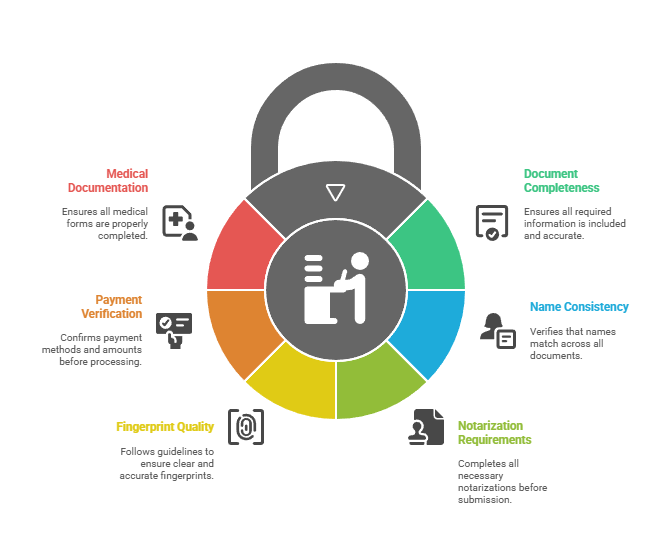
- Document Completeness: Review all requirements thoroughly before submission
- Name Consistency: Ensure exact matches across all submitted documents
- Notarization Requirements: Complete all required notarizations before submission
- Fingerprint Quality: Follow preparation guidelines and moisturize hands appropriately
- Payment Verification: Confirm payment methods and amounts before processing
- Medical Documentation: Ensure all medical forms are properly completed
Careful preparation prevents most common application problems. Therefore, applicants should review requirements thoroughly before beginning the process. Additionally, contacting the licensing agency with questions prevents costly mistakes.
Interstate Recognition and Reciprocity
Florida does not maintain reciprocity agreements with other states for armed security licensing. Out-of-state applicants must complete the full Florida licensing process. This includes training, background checks, and psychological evaluations.
However, some training components may transfer between states. Military police training and federal law enforcement experience often qualify for exemptions. Applicants should contact the licensing agency for specific guidance.
Background checks from other states are not accepted for Florida licensing. The Level 2 screening must be completed regardless of previous investigations. This ensures consistency with Florida's specific requirements and standards.
Former law enforcement officers may qualify for expedited processing. However, they still must complete psychological evaluations and firearms qualification. Additionally, their law enforcement experience must be properly documented.
License Renewal and Ongoing Requirements
Florida Class G licenses expire every two years from the issue date. Renewal applications must be submitted before expiration to maintain active status. Late renewals may require complete reapplication including new background checks.
The renewal process includes updated criminal history screening. Additionally, continuing education requirements must be fulfilled. Firearms requalification is also mandatory for armed security license renewal.
Ongoing monitoring occurs throughout the license period. The state receives notifications of new criminal activity involving licensed personnel. Serious violations can result in immediate license suspension or revocation.
Early renewal applications are accepted up to six months before expiration. This allows ample time for processing and prevents license lapses. Additionally, early renewals help avoid last-minute complications.
Continuing Education Requirements
Licensed armed security guards must complete annual continuing education courses. These courses cover legal updates, safety procedures, and industry best practices. State-approved providers offer various delivery methods including online options.
Documentation of completed continuing education must be maintained by license holders. Employers may also track these requirements for their personnel. Failure to complete required education prevents license renewal.
Continuing education covers emerging threats and response techniques. Topics include active shooter response, terrorism awareness, and de-escalation strategies. Additionally, legal updates ensure guards understand current laws and procedures.
Appeal Process for Denied Applications
Applicants have the right to appeal negative licensing decisions. The appeal process begins with a written request to the licensing agency. Supporting documentation and legal arguments should be included with the appeal.
Administrative hearings may be scheduled for complex cases. Applicants can present evidence and witness testimony during these proceedings. Legal representation is permitted but not required for appeals.
The appeal process typically takes 60-90 days for completion. During this time, applicants cannot work in armed security positions. Therefore, appeals should be filed promptly to minimize employment disruptions.
Character references and rehabilitation evidence strengthen appeal cases. Letters from employers, community leaders, and counselors demonstrate personal growth. Additionally, completion of education or treatment programs supports appeals.
Grounds for Successful Appeals
Most successful appeals involve procedural errors or incomplete information. Factual mistakes in criminal history records can be corrected through appeals. Additionally, proper documentation of expunged records may reverse denials.
Rehabilitation evidence is particularly important for criminal history appeals. Demonstrated employment stability, community involvement, and education completion support appeals. Furthermore, letters from probation officers or treatment providers carry significant weight.
Time passage since criminal convictions may influence appeal decisions. Applicants with old offenses and clean recent records have better appeal prospects. However, serious violent crimes rarely result in successful appeals.
Special Circumstances and Exemptions
Certain applicants may qualify for expedited processing or requirement modifications. Active military personnel receive priority processing for applications. Additionally, veterans may qualify for training exemptions based on military experience.
Federal security clearance holders may receive streamlined background processing. However, they still must complete psychological evaluations and firearms qualification. The federal clearance supplements but does not replace state requirements.
Retired law enforcement officers have specific exemption opportunities. However, retirement must be in good standing without disciplinary issues. Additionally, the retirement cannot exceed specific time limits for exemption eligibility.
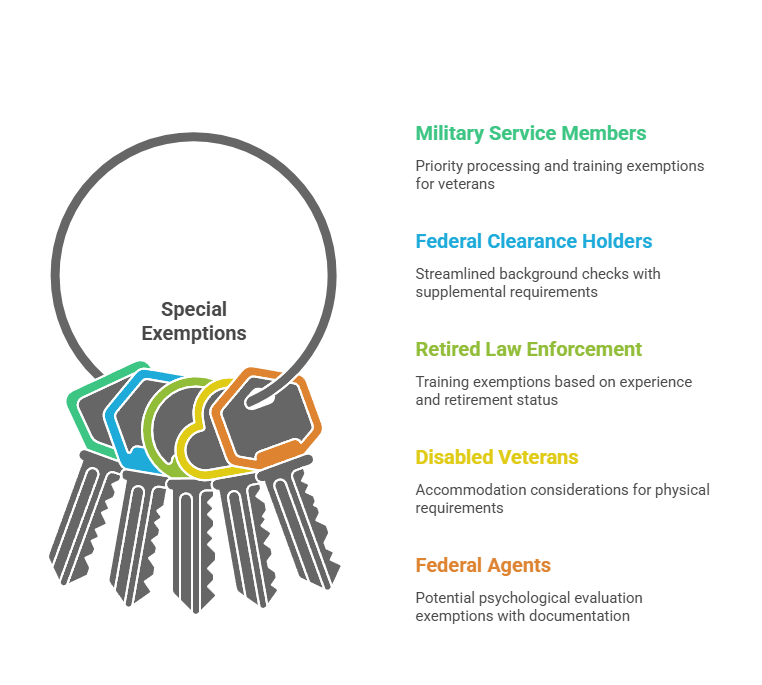
- Military Service Members: Priority processing and potential training exemptions
- Federal Clearance Holders: Streamlined background checks with supplemental requirements
- Retired Law Enforcement: Training exemptions based on experience and retirement status
- Disabled Veterans: Accommodation considerations for physical requirements
- Federal Agents: Potential psychological evaluation exemptions with proper documentation
Each exemption category has specific documentation requirements. Applicants must provide official records proving eligibility status. Additionally, exemptions may be limited to certain requirement categories.
Conclusion
Florida's comprehensive background check system for armed security guards ensures public safety while providing clear pathways for qualified candidates. The process requires patience and attention to detail, but ultimately creates professional opportunities in a growing industry. Understanding these requirements helps both job seekers and employers navigate the system successfully. With proper preparation and compliance, the licensing process can be completed efficiently while meeting all state requirements and maintaining the highest standards of professional security service.
Frequently Asked Questions
How long does a Florida armed security guard background check take?
The complete background check process typically takes 6-8 weeks from application submission to license approval. This timeline includes fingerprint processing, database searches, and administrative review. Incomplete applications or quality issues with fingerprints can extend this timeframe by 2-3 additional weeks.
What disqualifies someone from becoming an armed security guard in Florida?
Any felony conviction permanently disqualifies applicants, as do domestic violence charges and violent crimes. Certain misdemeanors including theft, fraud, and drug offenses create 10-year waiting periods. The state maintains discretionary authority to deny licenses for other criminal history demonstrating poor judgment or character issues.
How much does a Florida Class G license background check cost?
The total cost ranges from $400-$700, including the $75 state application fee, fingerprinting ($25-$55), training ($200-$400), psychological evaluation ($100-$200), and medical examination fees ($75-$150). Costs vary by training provider, location, and additional services required.
Can someone with a misdemeanor get an armed security license in Florida?
It depends on the type and timing of the misdemeanor offense. Violent crimes, theft, fraud, and dishonesty offenses typically create 10-year waiting periods from conviction date. Minor traffic violations or very old misdemeanors may not disqualify applicants, but each case is evaluated individually by licensing officials.
Do Florida armed security guards need federal background checks?
Yes, the Level 2 screening includes both state (FDLE) and federal (FBI) database searches. This comprehensive approach examines criminal history nationwide, ensuring no gaps in coverage regardless of where previous offenses may have occurred. Federal screening is mandatory for all armed security positions.
How often must armed security guards renew their background checks in Florida?
Background checks are updated every two years during license renewal cycles. Additionally, the state conducts ongoing monitoring for new criminal activity throughout the license period. Any disqualifying events that occur after licensing can result in immediate license suspension or revocation.
What happens if an armed security guard is arrested while licensed?
Licensed security guards must report arrests to the Department of Agriculture within 30 days. The agency will review the charges and may suspend the license pending case resolution. Convictions for disqualifying offenses result in permanent license revocation, while other charges may result in temporary suspensions.
Are there age requirements for Florida armed security guard licenses?
Applicants must be at least 21 years old to obtain a Class G armed security license. Additionally, they must be legally eligible to possess firearms under both state and federal law. Age verification is required during the application process through official identification documents.
Additional Resources
- Florida Department of Agriculture and Consumer Services - Security Licensing Division
https://www.fdacs.gov/Consumer-Resources/Professional-Licensing/Security-Officers - Florida Department of Law Enforcement - Background Screening Services
https://www.fdle.state.fl.us/Criminal-History-Records/Background-Screening.aspx - Florida Statutes Chapter 493 - Private Investigative and Security Services
http://www.leg.state.fl.us/Statutes/index.cfm?App_mode=Display_Statute&URL=0400-0499/0493/0493.html - LiveScan Fingerprinting Locations Directory - FDLE
https://www.fdle.state.fl.us/Criminal-History-Records/Fingerprint-Processing/LiveScan-Locations.aspx - Florida Security Officers Network - Training and Certification Resources
https://www.floridasecurityofficersnetwork.com/training-certification
Still have questions?
Get in touch with our team today for a personalized demo and discover how our tailored volume pricing and packages can drive results for your business!
How useful was this page?*
Note: your comments are anonymous. We use them to improve the website. Do not include any personal details.
Visit our FCRA Compliance Tool or leave a message here if you need a response.
From the blog Explore the GCheck Content Hub

How Long Do Background Checks Take for Government Jobs? Timeline Expectations for 2026
6 Jan, 2026 • 20 min read
Driver Qualification File Requirements: Your Complete DOT Compliance Guide
6 Jan, 2026 • 18 min read
Healthcare Background Screening Costs: 2026 Budget Planning Guide for Medical Facilities
30 Dec, 2025 • 23 min readThe information provided in this article is for general informational and educational purposes only and should not be construed as legal advice or a substitute for consultation with qualified legal counsel. While we strive to ensure accuracy, employment screening laws and regulations—including but not limited to the Fair Credit Reporting Act (FCRA), Equal Employment Opportunity Commission (EEOC) guidelines, state and local ban-the-box laws, industry-specific requirements, and other applicable federal, state, and local statutes—are subject to frequent changes, varying interpretations, and jurisdiction-specific applications that may affect their implementation in your organization. Employers and screening decision-makers are solely responsible for ensuring their background check policies, procedures, and practices comply with all applicable laws and regulations relevant to their specific industry, location, and circumstances. We strongly recommend consulting with qualified employment law attorneys and compliance professionals before making hiring, tenant screening, or other decisions based on background check information.
